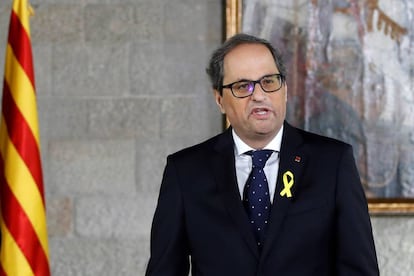Madrid maintains direct rule in Catalonia over “provocative” cabinet picks
New Catalan premier taps four ex-officials facing legal battles, and Madrid refuses to publish their names on official gazette

The Spanish government continues to exert direct control over Catalan affairs even though a new regional leader has emerged.
The newly inaugurated Quim Torra, a hard-line separatist who views himself as a stand-in for ousted ex-premier Carles Puigdemont, has drafted a list of cabinet members that includes four former officials of the breakaway government. Two of these individuals are fugitives from justice, and two more are in custody awaiting trial over rebellion and misuse of public funds.
As a result, Madrid is refusing to publish the list in the official gazette, Diario Oficial de la Generalitat de Cataluña, effectively preventing the new Catalan government from taking office. Central authorities have described Torra’s cabinet picks as “a provocation” that seeks “confrontation with the [Spanish] state.”
Article 155 will only be lifted once a new Catalan government is formed and the decree published
Article 155 of the Spanish Constitution, which lets Madrid exert direct rule over the region, will only be lifted once a new Catalan government is formed and the decree listing its makeup is officially published in the regional gazette.
Who’s the boss?
This has created a novel situation in which Torra is the head of the Catalan government, yet each regional department will continue to answer to the national minister currently in charge of each area. Sources in the executive admitted that it is unclear who Torra will be giving orders to.
On Friday, Spanish government spokesman Íñigo Méndez de Vigo had warned that individuals awaiting trial or wanted by the justice system should not be included in the cabinet list. On Saturday, Spanish Prime Minister Mariano Rajoy talked with opposition leaders Pedro Sánchez of the Socialist Party (PSOE) and Albert Rivera of Ciudadanos to discuss the new scenario. Both men supported the introduction of direct rule last year, and last week they met with Rajoy to consider further emergency measures in the wake of Torra’s inauguration and defiant statements.

Now, Madrid is exploring legal formulas to back up its decision to block Torra’s controversial cabinet picks. In the meantime, Article 155 remains fully in force, said executive sources.
Madrid has published one decree signed by Torra, setting out the structure of his government and the powers that fall to each department. But central authorities ares refusing to make a second decree listing the names of Torra’s new team official; this list includes Josep Rull and Jordi Turull, two former Catalan officials currently in pre-trial custody, and two more who fled Spain to avoid legal action, Lluís Puig and Toni Comín. All of them have been prosecuted in connection with the breakaway bid.
There are other candidates who are unencumbered by legal battles, but because the whole list was presented in a single decree, individual names may not be approved, said the same sources.
Article 155
Direct rule was introduced in late October, when Madrid invoked Article 155 of the Spanish Constitution to temporarily revoke self-rule in the breakaway region. The Senate approved the emergency measures with the provision that they would be lifted as soon as a new Catalan government was formed.
Madrid is exploring legal formulas to justify blocking Torra’s controversial cabinet picks
But the snap election of December narrowly gave another victory to separatists, who rejected Spanish Prime Minister Mariano Rajoy’s advice to produce “a normal” candidate, i.e. one not facing legal battles because of personal involvement in the unilateral breakaway bid.
Following five months of deadlock and three failed nominations, Quim Torra was sworn in last week. Torra, who is being investigated for hate speech against Spaniards and Spanish-speaking Catalans, has promised to continue down the path of unilateral independence and to restore Catalonia’s “legitimate” leaders, who were removed from office when Article 155 took effect.
During these seven months of direct rule, Madrid has refrained from getting involved in regional policy-making, and has instead focused on handling routine affairs involving public services. But the situation now becomes more complicated because of the duality of powers.
Additionally, the Spanish government was hoping for support this week from the Basque Nationalist Party (PNV) to ensure passage of its budget blueprint. But the PNV has clearly stated that lifting Article 155 is a non-negotiable condition for its support.
English version by Susana Urra.
Tu suscripción se está usando en otro dispositivo
¿Quieres añadir otro usuario a tu suscripción?
Si continúas leyendo en este dispositivo, no se podrá leer en el otro.
FlechaTu suscripción se está usando en otro dispositivo y solo puedes acceder a EL PAÍS desde un dispositivo a la vez.
Si quieres compartir tu cuenta, cambia tu suscripción a la modalidad Premium, así podrás añadir otro usuario. Cada uno accederá con su propia cuenta de email, lo que os permitirá personalizar vuestra experiencia en EL PAÍS.
¿Tienes una suscripción de empresa? Accede aquí para contratar más cuentas.
En el caso de no saber quién está usando tu cuenta, te recomendamos cambiar tu contraseña aquí.
Si decides continuar compartiendo tu cuenta, este mensaje se mostrará en tu dispositivo y en el de la otra persona que está usando tu cuenta de forma indefinida, afectando a tu experiencia de lectura. Puedes consultar aquí los términos y condiciones de la suscripción digital.









































